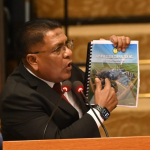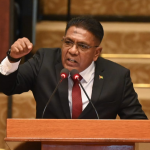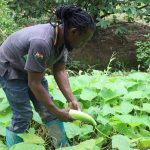─ other small-scale livestock farmers to benefit
The Ministry of Agriculture on Saturday distributed 25 black giant chicks and a bag of feed each to some 30 residents, including single parents and vulnerable farmers, from Mon Choisi village in Region Five, (Mahaica-Berbice).
Minister, Zulfikar Mustapha told the farmers that as their businesses progress, they will be expected to give back a comparable number of chicks to other farmers in the area.
“We will take back chicks from you to help in other areas. This is not only for a single group, but the ministry intends to help other farmers through this programme, every person who received 25 chicks will at least have to give back ten in about 12 months,” minister Mustapha said.
The move by the ministry is to expand income generation for small-scale livestock farmers in the region, especially among vulnerable groups, as the government moves ahead with its food security agenda.
Teacher, Ravena Ghanie spoke with the Department of Public Information (DPI) on the value of the assistance.
“We have been asking the various ministries to assist in helping to build our local farming group of single parents, women, and poor and needy farmers within the community. This here will be a great start for us, and I want to say thanks to the Minister of Agriculture, the ministry and everyone who have been involved in assisting us here today” she said.
Government has developed an overarching strategy with stakeholders, including farmers, and the private sector to achieve the 25 by 2025 goal. The aim is to reduce CARICOM’s food import bill by 25 per cent come 2025.

To this end, the PPP/C Administration has embarked on a slew of initiatives, which include the brackish-water shrimp production, corn and soya bean, Barbados black belly sheep, and shade house projects as some of the notable agriculture interventions being undertaken locally.
President Ali on March 27, launched the black belly sheep project in the Mahaica-Berbice (Region Five). With Region Five being Guyana’s largest producer of livestock, the president stated that it has the potential to become the livestock capital of the Caribbean Community.







